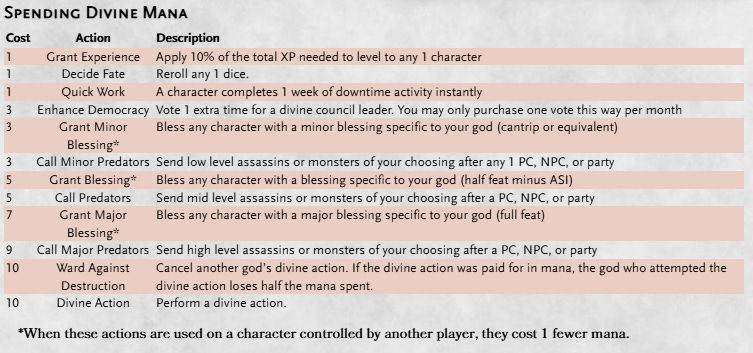Godstein Part 3: Resources and Mana
This is the third in a series of blog posts about my Godstein game. I recommend starting at the first.
Transitioning from a world creation Braunstein to a D&D campaign was rather simple. We chose to use the 2014 version of D&D 5e because that is what everyone was familiar with and a campaign that that was going to be this different from any other campaign that any of us had played could benefit from player familiarity with the rules. I’d been told that I should use AD&D for this, and it may very well be the better option, but I didn’t want to burden my players with learning a new system on top of the new campaign structure we were trying.
At this point, the timescale had to change from sessions that covered 1,000 years to sessions that covered 1 week. I’ll talk more about this in a future post, but we did enforce strict 1:1 time in this game- time in the game world moved at the same speed as the real world, with each weekly session covering roughly 1 week of game time.
They all made characters and did a few quests, but it felt like we were missing a ruleset for their gods to interact with the world. My solution was to give the gods a resource called mana. Mana would be freely tradable among gods and they could use their mana to influence the world, which would hopefully keep the gods relevant now that we were playing a more normal RPG campaign instead of a Braunstein.
This is the chart I gave them to show what they could do with their mana, note that several things on this chart refer to 5e concepts like feats. In a different system, those would need to be changed. Additionally, this list was not intended to be exhaustive and the players were encouraged to get creative with their actions.
The Enhance Democracy action references the Divine Council, which will have to be another post. As the name implies, I did implement a monthly vote among the gods, which is one reason I wanted to make the mana tradable, so that the players could bribe each other using it.
The players in the campaign would earn mana for their god in the following ways:
Leveling a character to 5 or higher (they would get 1 mana for 5 and then 1 for each level beyond 5)
Another player leveled a cleric who worships their god to levels 5, 7, 9, 11…
A quest is completed in service to their god.
They were elected Divine Council Leader
I emphasized secrecy with this system. New players started with 1d3 mana and no player knew another’s total. Of course, they were allowed to share information, but the one rule I had was that they could not screenshot anything from their private chat channels to prove it, so they were allowed to lie about how much they had. Additionally, unless they made it public themselves, I wouldn’t share how they spent their mana.
I was concerned that players would not roleplay this as much as I would like, but that was not the case. They took actions mostly in line with their god’s vision for the world, blessed characters that served them, bought votes when they thought it would help, and occasionally used mana for rerolls and XP, sometimes for other characters.
This system was also intended to incentivize players to play clerics/paladins who worshipped gods other than their own by generating mana for that god. I was asked by a few players how that was supposed to incentivize them to do this, but eventually, they started to realize the power of diplomatically making clerics to worship each other’s gods and slowly accruing mana for it.
I also made it cheaper to bless other players’ characters instead of their own, and since I also specified that the blessings had to be thematic to the god, the players started to make deals amongst each other, which was what I wanted.
The mana system added to the game by keeping the gods involved in a structured and limited way after the world creation Braunstein and by also giving them a way to help each other and share resources.
The major issue I found with this system was that the methods of accruing mana sometimes made questionable sense for their god. For example, they would gain 1 mana for getting a character to level 5, but if that character wasn’t a worshipper of their god, then I found it difficult to justify thematically that the god would gain resources for it. The system was intended to incentivize participation and reward players who attended games and made alliances with others while letting them interact with the world as their god, but the system wasn’t flawless.
Despite its problems, giving the gods a resource allowed them to still remain relevant post-transition from Braunstein to an RPG campaign. I expect that it wouldn’t work quite as well with players who didn’t care to roleplay their gods- I’m lucky that my players have done well with this!


